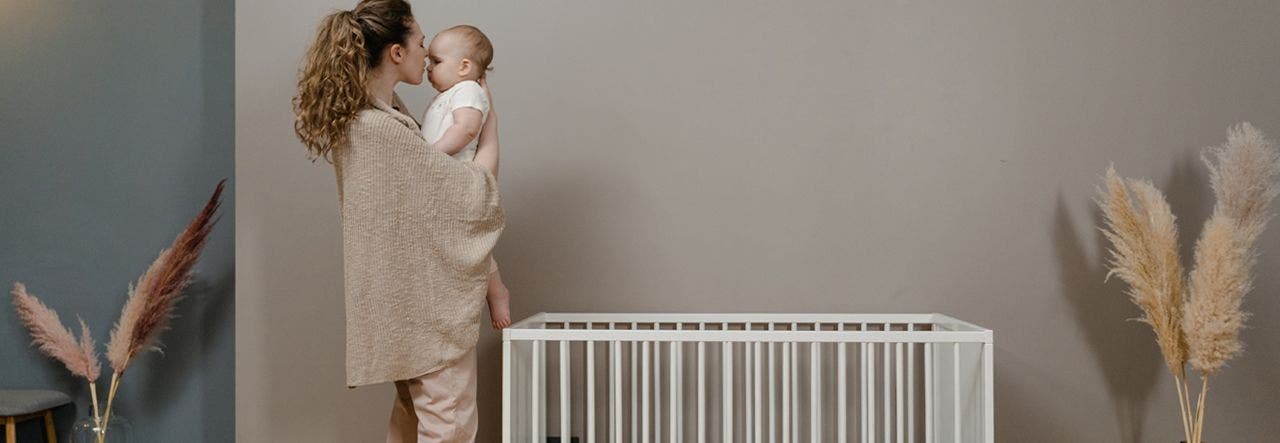It's no secret that creating a safe sleep environment for your child is critical – even if it can feel like a daunting task. Whether you’re trying to ensure safe sleep for a newborn baby or are transitioning a toddler to their first big kid bed, it's important to remember that safe sleep is a priority for your child’s health and well-being.
If you’re not sure where to start when it comes to safe sleep for your little one, take a breath. I’m a gentle sleep coach, and we can start together right now. Let’s take a look at five different areas to consider when creating a safe sleep environment for your child.
1. Your Baby's Crib


Let’s start with basic crib safety since your baby will be spending a lot of time in theirs! When you bring your newborn home from the hospital, they will sleep in a bassinet or crib. Maybe you have both. Just make sure that these conform to all current standards, including the safe sleep information for crib and infant products provided by the Consumer Product Safety Commission (CPSC).
And, please note that although I love the idea of an antique crib, they are not safe and may even be covered in lead paint! Here are some tips on finding a non-toxic crib.
The crib mattress itself should be firm and flat, and remember to always place your baby on their back to sleep. These precautions can dramatically reduce the risk of SIDS.
Instead of using blankets (which can be a suffocation risk), dress your little one in layers and use a sleep sack. The sleep sack cannot be kicked off and keeps your child warm as they move around. Dress your baby in one more layer than you would wear and no hats are necessary whilst Baby is sleeping.
In fact, there shouldn't be anything in the crib or bassinet with your infant. They don't need a pillow and will comfortably sleep without one. Keep stuffed animals and toys out of the crib or bassinet, as they are also suffocation risks. Avoid crib bumpers for the same reason.
If you swaddle your child, they don't need a blanket on top. You'll want to stop swaddling when they show signs of rolling from their back to their tummy.
2. The Room Where Baby Sleeps


Beyond the crib itself, you’ll want to take a close look at the room that your baby sleeps in. Keep your baby's crib or bassinet away from windows, curtains or heaters. You’ll also want to ensure the bedroom isn't too hot or too cold. Ideally, 68–72ºF/20–23ºC is perfect.
For the first 6 to 12 months, room-sharing is an excellent option. Not only does this make night feeds so much easier, but it can also significantly reduce the risk of SIDS. Of course, you can room share for longer if you want. Just remember that room-sharing (sleeping with the crib in the same room as where you sleep) does not mean co-sleeping (sleeping in the same bed).
If you do bring your baby into your bed to feed them during the night, make sure you sit up to feed them and return your little one to their bed after they’re done nursing or taking the bottle. If you worry about falling asleep, it’s safer to just get up and sit in a recliner or on a couch, just in case.
3. Your Toddler's Bed


If your child is 12 months or older, congrats – you’ve got a toddler on your hands and a whole new set of sleep safety concerns (hello, 12-month sleep regression!). In general, your toddler can continue to sleep safely in a crib. However, if your kiddo tries to climb out of the crib, it may be time to move them to a bed.
Does your crib transform into a toddler bed? That can make life easier. You can continue to use your crib mattress in a toddler bed. Naturepedic’s Classic Organic Crib Mattress, along with their Breathable and Breathable Ultra mattresses, have a firm side for babies and a medium firm side for toddlers, ensuring your toddler gets the most comfortable night's sleep.
Your toddler may like to have a light blanket in bed with them now. Just don't be surprised if they don't! Toddlers often end up throwing their blankets out of bed.
You can also introduce a small, safe stuffed animal when your child is over a year old. Don't worry if they don't get attached to anything. That often comes when a child is over 2 years old.
Finally, you can try introducing a pillow when your toddler is over 18 months old. This pillow shouldn't be too thick. Naturepedic makes my favorite pillow for toddlers. It’s non-toxic and supportive and has a low fill option. Plus, there’s no latex if you’re worried about allergies.
4. Your Toddler's Bedroom


Right, here’s where parenting gets fun. If your toddler is sleeping in their own room in a toddler bed, they can get themselves out of that bed whenever they want to! You'll want to make sure that their bedroom is incredibly safe.
Attaching large pieces of furniture to the walls is a must. Toddlers love to climb! You don't want them climbing up something like a dresser or bookshelf, pulling it over and getting trapped beneath.
Keep windows locked. Remember, screens are not designed to keep children or pets safe. They are designed to keep bugs out and can quite easily be pushed out of a window. If you need to keep a window open, it shouldn't be opened more than 4 inches and should be locked in place.
If you have blinds at the windows, ensure the cords are wound up and secured away from your curious toddler. Cordless blinds are an even safer option.
Does your child have a toy box? If so, the hinges should have hinge guards, and the box shouldn't have a lock. You don't want your child climbing in and getting themselves stuck – that’s both scary and dangerous.
If your toddler is still safe and happy sleeping in their crib, remove the mobile if you haven’t done so yet. They are big enough now to grab it, pull it into the crib and get entangled.
5. Keep the Bedrooms Safe


Setting up a safe sleep environment isn’t a one-time deal. Like many aspects of parenting, safe sleep for babies and toddlers is an ongoing process. Periodically check your and your child's bedrooms for hazards.
It's easy to bring things into the bedroom, not put them away, and accidentally create an unsafe sleep space – everything from laundry to art supplies to forgotten snack cups and bowls. Get down onto the floor and look around. A different perspective may help you identify something hazardous. If your toddler tends to get up and walk around at night, consider a nightlight, too.
Test your smoke and carbon monoxide alarms twice a year. The best time to do this is at the start and end of daylight saving time.
Safe sleep is important no matter what age your child is. And, as your child grows, their sleep needs will change, too. Check out these safe sleep guidelines from American Academy of Pediatrics and never be afraid to contact your pediatrician or a professional sleep consultant for extra help.
 BABY
BABY  KIDS
KIDS  ADULT
ADULT  LEARN
LEARN  STORES
STORES 
